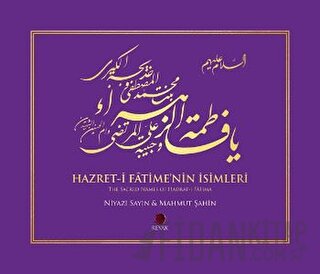
Vücud-ı Mutlak'ın zuhür sebebi Cenab-ı Muhammed, onun da zuhürunun baisi Hakikat-i Fatimiyye'dir. Bundan dolayıdır ki, Hazret-i Fatime için "Ümmü Ebiha / Babasının Annesi" buyurulmuştur. Hazret-i Betûl'ün zatını idrak edebilmek imkan dairesinde olmadığından; evsafını tahsil hususunda beşeriyete hediye edilmiş manevi hazinelerden biri de, onun isimleri, sıfatları ve künyeleridir.
Bunlardan altmış üç tanesi, “Hazret-i Fatime'nin İsimleri” adlı eserde bir araya getirilmiş ve günümüzün kıymetli hattatlarından Mahmut Şahin tarafından meşk edilip, Kutbu'n-Nayi Niyazi Sayın'ın ebruları ile tezyin edilmiştir. Her levhanın yanında, o levhadaki ibarelerin okunuşu, lügat mânâları, irfani yorumları ve Hazret-i Kevser ile alâkalı bir hadîs-i şerif istifadeye sunulmuştur.
Metinlerin İngilizce tercümeleri de verilerek, insanlık idealinin şahikası olan o hazretin en azından vasıfları tanıtılmaya gayret edilmiştir. Böylelikle Hazret-i Zehra'nın zatının idrak edilmesinin mümkün olmadığına ve bu imkansızlık idrak edildiği oranda kişinin kemâlde derinleşeceğine işaret edilmiştir.
Hem bir sanat albümü hem de Hazret-i Azra hakkında ilmî bir derleme niteliğinde olan eser, pek çok açıdan bir ilk olma özelliğini taşımaktadır.
The purpose of the manifestation of The Absolute Being (Wujûd-i Mutlaq) is Hadrat-i Muhammad and the cause of his manifestation is The Truth of Fâtima. It is because of this that Hadrat-i Fâtima is referred to as "The Mother of Her Father". Because it is impossible to truly know her essence, her sacred names and titles are a gift offered to humanity, so that she may be understood, at least on the level of her attributes.
Of these sacred names, sixty three have been compiled in a book named “The Sacred Names of Hadrat-i Fâtima”. The names have been written by one of the most valued calligraphers of our time, Mahmut Şahin, and each has been framed by the marblings (ebrus) of The Master of Neyzens Niyazi Sayın. On each page opposite the piece of calligraphy, the reader will find the pronunciation of the name, accompanied by its literal meaning and interpretations, along with a hadith concerning each sacred name.
An English translation of the texts has also been included in efforts to make the pinnacle of the human ideal (Hadrat-i Fâtima) known to as many as possible, at least through her titles. The approach of this work is an acknowledgement that her essence in and of itself cannot be known and this acknowledgment by the reader alone contributes to growth in wisdom.
This piece is both an album of artwork as well as a scholarly compilation, and as such, a “first” in many respects.
Vücud-ı Mutlak'ın zuhür sebebi Cenab-ı Muhammed, onun da zuhürunun baisi Hakikat-i Fatimiyye'dir. Bundan dolayıdır ki, Hazret-i Fatime için "Ümmü Ebiha / Babasının Annesi" buyurulmuştur. Hazret-i Betûl'ün zatını idrak edebilmek imkan dairesinde olmadığından; evsafını tahsil hususunda beşeriyete hediye edilmiş manevi hazinelerden biri de, onun isimleri, sıfatları ve künyeleridir.
Bunlardan altmış üç tanesi, “Hazret-i Fatime'nin İsimleri” adlı eserde bir araya getirilmiş ve günümüzün kıymetli hattatlarından Mahmut Şahin tarafından meşk edilip, Kutbu'n-Nayi Niyazi Sayın'ın ebruları ile tezyin edilmiştir. Her levhanın yanında, o levhadaki ibarelerin okunuşu, lügat mânâları, irfani yorumları ve Hazret-i Kevser ile alâkalı bir hadîs-i şerif istifadeye sunulmuştur.
Metinlerin İngilizce tercümeleri de verilerek, insanlık idealinin şahikası olan o hazretin en azından vasıfları tanıtılmaya gayret edilmiştir. Böylelikle Hazret-i Zehra'nın zatının idrak edilmesinin mümkün olmadığına ve bu imkansızlık idrak edildiği oranda kişinin kemâlde derinleşeceğine işaret edilmiştir.
Hem bir sanat albümü hem de Hazret-i Azra hakkında ilmî bir derleme niteliğinde olan eser, pek çok açıdan bir ilk olma özelliğini taşımaktadır.
The purpose of the manifestation of The Absolute Being (Wujûd-i Mutlaq) is Hadrat-i Muhammad and the cause of his manifestation is The Truth of Fâtima. It is because of this that Hadrat-i Fâtima is referred to as "The Mother of Her Father". Because it is impossible to truly know her essence, her sacred names and titles are a gift offered to humanity, so that she may be understood, at least on the level of her attributes.
Of these sacred names, sixty three have been compiled in a book named “The Sacred Names of Hadrat-i Fâtima”. The names have been written by one of the most valued calligraphers of our time, Mahmut Şahin, and each has been framed by the marblings (ebrus) of The Master of Neyzens Niyazi Sayın. On each page opposite the piece of calligraphy, the reader will find the pronunciation of the name, accompanied by its literal meaning and interpretations, along with a hadith concerning each sacred name.
An English translation of the texts has also been included in efforts to make the pinnacle of the human ideal (Hadrat-i Fâtima) known to as many as possible, at least through her titles. The approach of this work is an acknowledgement that her essence in and of itself cannot be known and this acknowledgment by the reader alone contributes to growth in wisdom.
This piece is both an album of artwork as well as a scholarly compilation, and as such, a “first” in many respects.










